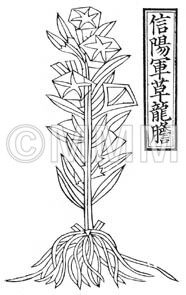Crude drug sample data base
※Click on the image to enlarge it.
The capital city, provincial capital city or the representative
location of its administrative area is indicated.
location of its administrative area is indicated.
41.805699
123.43147199999999
Production area information
People's Republic of China,Liaoning Prov.
https://ethmed.toyama-wakan.net/img/pin_san.png
34.6937249
135.5022535
Collection information
Japan(ToS),Osaka Pref.
https://ethmed.toyama-wakan.net/img/pin_nyu.png
Scientific information data base
| Common name | 竜胆, Longdan, Gentianae Scabrae Radix (JP18), Gentianae Radix et Rhizoma (CP2020), Japanese Gentian (JP18), Chinese Gentian (CP2020) | |||||
|---|---|---|---|---|---|---|
| crude drug image |
| |||||
| Original plant name | Gentiana scabra Bunge1, Gentiana manshurica Kitagawa, Gentiana triflora Pallas, and etc. (Tōrindō1) | |||||
| original plant image |
| |||||
| Family name | Gentianaceae | |||||
| Used part | root and rhizome | |||||
| Quality for selection | Good Longdan is large, pale yellowish-brown and has many fibrous roots. (TN) | |||||
| Official compendium | JP XVIII, CP (2020 ed.) | |||||
| Clinical application | As a bitter stomachic, it is used just like Gentian (the root and rhizome of Gentiana lutea L.) . In Kampo, as an anti-inflammatiory, it is applied to treat congestion of digestive organs, inflammation, urethriris, and rheumatoid. | |||||
| Medical system | Traditional Chinese medicine | |||||
| Drug effect in traditional medicine | Traditional classification | Drugs for elimination heat and dampness | ||||
| Beneficial effect | [Property and Flavor] Cold; bitter. [Meridian Tropism] Liver and gallbladder meridians. [Actions] To clear heat and dry dampness, purge liver-gallbladder fire. [Indications] Dampness-heat jaundice, pudendal swelling and itching, vaginal discharge, itching caused by eczema, red eyes caused by liver fire, tinnitus and deafness, hypochondriac pain and bitter taste in the mouth, persistent erection, convulsions. | |||||
| Chemical constituent | Oligosaccharides (*C1): Gentianose, Gentiobiose Monoterpenoids (*C1): Gentiopicrin, Swertiamarin, Gentianine G. triflora var. japonica (*C1): Trifloroside Xanthones (*C1): Gentisin Other aromatic derivatives (*C1): Gentisic acid | |||||
| Chemical structure |
※画像をクリックすると、拡大して表示されます。 | |||||
| Pharmacological effect | enhanced gastric juices secretion (extract), immunosuppression (mild). | |||||
| DNA sequence | AJ294588, AJ294648; Traditioal Medical & Parmaceutical Database. | |||||
| Classical reference (Chinese Herbal Classic "Zhenglei bencao") |  ※Click this image to see the actual image ※Click this image to see the actual image | |||||
| Disease | Jaundice, Dysuria, Urodynia, Cloudy urine, Scrotal swelling, Itching of the genital, Leukorrhea, Red eye, Eye pain, Chest pain, Pain of lateral sides of trunk, Deafness, Swelling and pain of the ear, High fever, Convulsion | |||||
| Formulation | Jokinritsuansan, Sokeikakketsuto, Rikkosan, Ryutan-shakan-to, Ryutan-shakan-to, Kumisaikoto | |||||
| Related drugs | Gentianae Radix (the root and rhizome of Gentiana lutea L.), Gentianae Macrophyllae Radix (the root of Gentiana macrophylla Pall., G. straminea Maxim., G. crassicaulis Duthie ex Burkill or G. dahurica Fisch.) | |||||
| References | JP18: The 18th edition of the Japanese Pharmacopoeia. CP2020: Pharmacopoeia of the People's Republic of China 2020 edi. C1)The Encyclopedia of Wakan-Yaku with Color Pictures Vol. I, pp 166-167. | |||||
| Remarks | Guan-longdan (関龍胆), produced in the Northeast provinces of China, contains the subterranean part of G. triflora Pall., as a fraction. The original plant of "Yunnan-longdan" (雲南龍胆) and "Guizhou-longdan" (貴州龍胆) (produced in Yunnan, Guizhou, Sichuan Prov.) are G. regescens Fr. and the part used is the subterranean part. In the past, Japanese "Karahuto-ryūtan" (樺太龍胆) or "Ezo-ryūtan" (蝦夷龍胆) was available in the market, which was the subterranean part of G. triflora Pallas var. japonica Hara (Ezo-rindō in Jap.), but it has no marketability now. | |||||
| Last renewal date | 2021/09/27 | |||||

















